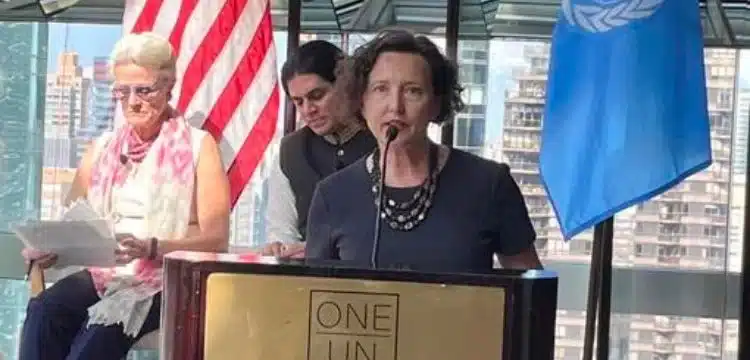[vc_row][vc_column][vc_column_text dp_text_size=”size-4″]The United States, represented by Elizabeth Horst, the US Deputy Secretary of State Responsible for Pakistan, has reaffirmed its commitment to supporting legitimate elections in Pakistan devoid of violence, ensuring the people’s right to choose their leadership.
Speaking at a seminar held at One UN Plaza as part of the 78th session of the UN General Assembly, Ms. Horst emphasized the importance of Pakistan implementing reforms recommended by the International Monetary Fund (IMF) as a crucial step to stabilize its struggling economy.
Addressing the audience, including Ambassador Robin Raphel and other scholars, during the seminar on “Exploring the Pillars of Democracy: US-Pakistan Relations,” Ms. Horst highlighted that the withdrawal of US forces from Afghanistan has allowed for a renewed focus on the bilateral relationship with Pakistan, encompassing economic security and political dynamics.
Also Read: Iconic Speech by Martin Luther King Jr. that Shaped a Movement and United a Nation
She underscored the US’s unwavering support for Pakistan’s democratic process, emphasizing that it does not endorse any specific individual or political party. Rather, the US advocates for the people of Pakistan to exercise their right to determine their government through transparent and lawful elections.
Ms. Horst stressed that these elections should be free from violence, promote open competition, and allow free media coverage. Furthermore, she pointed out that democracy encompasses more than just elections, emphasizing the importance of discussions on religious freedom, the misuse of blasphemy laws, and the rights of minorities in Pakistan.
In addition, Ms. Horst expressed optimism about the potential of the US-Pakistan partnership, emphasizing the importance of continuing constructive dialogues.
Ambassador Raphel, known as a strong advocate for Pakistan in Washington, expressed her concerns about the current political crisis in Pakistan, attributing blame to all sides involved. She called for holding elections as the only way to allow the people to have a say in their representation.
Regarding Pakistan’s economic challenges, Ms. Horst acknowledged the concerns while highlighting the country’s potential. She noted the longstanding relationship between Pakistan and the IMF, underscoring the importance of continuing reforms in areas such as the energy sector and tax reform. The US pledged support for these reforms, believing they are vital for attracting investors and tapping into Pakistan’s intellectual talent.
Kicking off #UNGA78 @State_SCA's Elizabeth Horst joined a panel with @MALANational on strengthening democracy in Pakistan, celebrated @APAGUSA historic naming of Allama Iqbal Avenue in Queens, & spoke with students @nyusteinhardt about US foreign policy & careers @StateDept. pic.twitter.com/nVUawIrVO6
— State_SCA (@State_SCA) September 12, 2023
Ms. Horst mentioned that the US and Pakistan were engaged in economic, defense, and security dialogues to chart a new course for their relationship. Avishan Bodjnoud, Chief of the United Nations Department of Political and Peacebuilding Affairs (DPPA-DPO), called upon the global community to recommit to democratic principles and ensure inclusivity for all.
The seminar, organized by the Muslim American Leadership Alliance, aimed to address Pakistan’s challenges and provide solutions to stabilize its economy.
Guest speaker Dawood Ghaznavi from Pakistan proposed five key points for achieving stability, including adherence to the constitution for political stability, a renewed US-Pakistan security pact, the development of a stronger middle class to bolster democracy, a commitment to the rule of law, and enhanced people-to-people relations between Pakistan and the United States.
[/vc_column_text][/vc_column][/vc_row]











